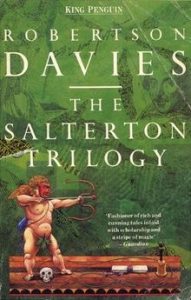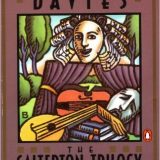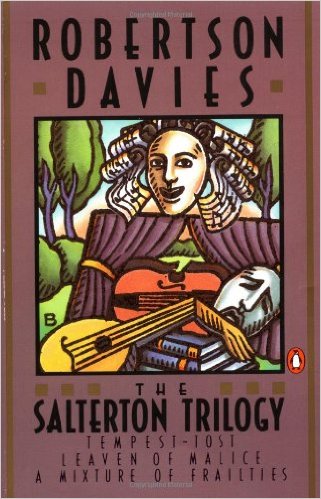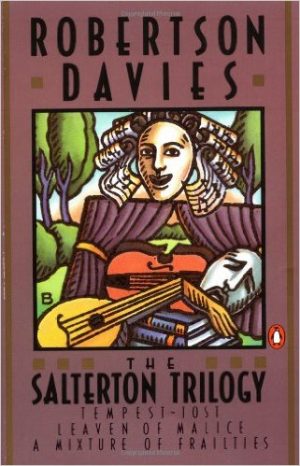The Salterton Trilogy – Robertson Davies – 1951-1958
Reviewed by: D.W. Cymbalisty Date: 30 July 2001
 I caution you, reading this series may cause a severe addiction to Davies! It starts out great and just keeps getting better and better, like a snowball gathering momentum and size as it tumbles downhill. Far and away, the brightest of these three gems is the third, A Mixture Of Frailties. How did Davies do it? He took such seemingly innocuous molehills, and fashioned great mountains out of them. As with the innocently thrown snowball in his Deptford Trilogy, here he uses a false engagement notice (in Leaven of Malice) to grease the gears of a roaring good yarn. Tempest-Tost is the one book of this trilogy that can stand the surest on its own, the other two being more sequentially tied to each other in their characterization and story line. The trilogy shouts a resounding THREE CHEERS FOR CANADIAN LITERATURE! Time well spent in a book… imagine that!
I caution you, reading this series may cause a severe addiction to Davies! It starts out great and just keeps getting better and better, like a snowball gathering momentum and size as it tumbles downhill. Far and away, the brightest of these three gems is the third, A Mixture Of Frailties. How did Davies do it? He took such seemingly innocuous molehills, and fashioned great mountains out of them. As with the innocently thrown snowball in his Deptford Trilogy, here he uses a false engagement notice (in Leaven of Malice) to grease the gears of a roaring good yarn. Tempest-Tost is the one book of this trilogy that can stand the surest on its own, the other two being more sequentially tied to each other in their characterization and story line. The trilogy shouts a resounding THREE CHEERS FOR CANADIAN LITERATURE! Time well spent in a book… imagine that!
I refrain from offering synoptic comments of what I got out of each book for fear of robbing anyone the pleasure of finding these gifts for themself as they read. I have rarely encountered in fiction a more thoroughly developed character than that of Davies’ Monica Gall in A Mixture of Frailties. In her, he brilliantly shows us the inner workings of the creation of the distinctly female artistic temperament, and the MAKING of an individual. On this theme, the only thing I have ever come across as being on an equal par would be Willa Cather’s creation of the singer Thea Kronborg in her The Song of The Lark. The Salterton Trilogy reminds me of Anthony Burgess’s comment that Davies displayed “all the qualities of a latter day Trollope.” I would agree, with the addendum that Davies doesn’t seem to require the verbosity of Trollope to achieve equal (or greater) depths. The genius of Davies is that he ends his books before we want him to. Arguably, there will be those who feel this particular series (written in the 50’s) to be somewhat “dated”… i.e., nobody in these stories gets e-mail, orders a non-fat latte, or knows what it means to write an online review! Davies stuff is the antithesis of pulp fiction! Webster’s defines literature as “written works having excellence of form or expression and dealing with ideas of permanent interest.” It’s a good definition to keep in mind when reading anything by Davies. There are lots of great Canadian novels out there… but Davies here proves once again that there is also such a thing as a Canadian “literature”!
















